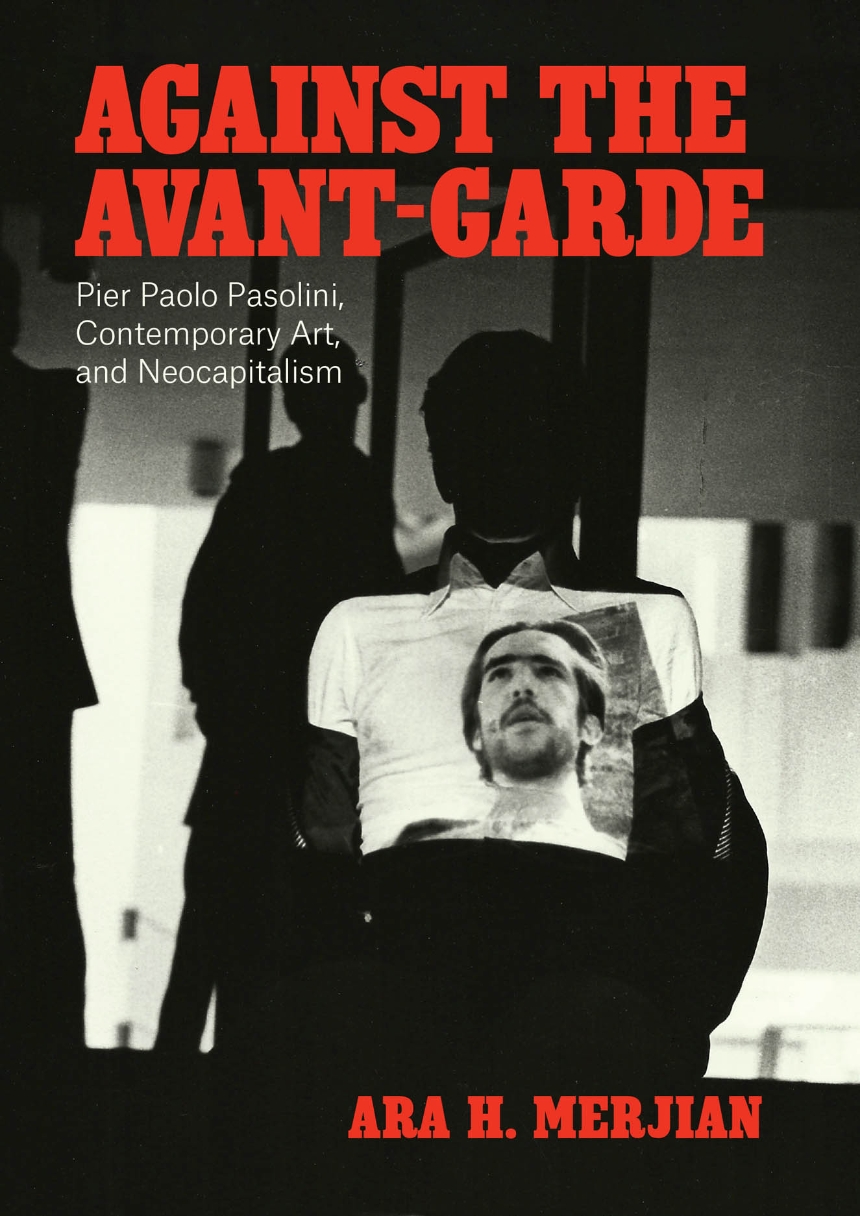Against the Avant-Garde
Pier Paolo Pasolini, Contemporary Art, and Neocapitalism
Recognized in America chiefly for his films, Pier Paolo Pasolini (1922–1975) in fact reinvented interdisciplinarity in postwar Europe. Pasolini self-confessedly approached the cinematic image through painting, and the numerous allusions to early modern frescoes and altarpieces in his films have been extensively documented. Far less understood, however, is Pasolini’s fraught relationship to the aesthetic experiments of his own age. In Against the Avant-Garde, Ara H. Merjian demonstrates how Pasolini’s campaign against neocapitalist culture fueled his hostility to the avant-garde. An atheist indebted to Catholic ritual; a revolutionary communist inimical to the creed of 1968; a homosexual hostile to the project of gay liberation: Pasolini refused the politics of identity in favor of a scandalously paradoxical practice, one vital to any understanding of his legacy. Against the Avant-Garde examines these paradoxes through case studies from the 1960s and 1970s, concluding with a reflection on Pasolini’s far-reaching influence on post-1970s art. Merjian not only reconsiders the multifaceted work of Italy’s most prominent postwar intellectual, but also the fraught politics of a European neo-avant-garde grappling with a new capitalist hegemony.
304 pages | 37 color plates, 138 halftones | 7 x 10 | © 2020
Art: Art Criticism, European Art
Literature and Literary Criticism: Romance Languages
Reviews
Table of Contents
Introduction Heretical Aesthetics
Technical Sacrality/Heretical Aesthetics
Against the Avant-Garde
Communism, Humanism, Modernism
Aesthetic Deceleration
A Tradition of Antitradition
One Abstraction: The Zero Degree of History
Abstraction and Neocapital
History, Rage, Painting
Abstraction and/as Failed Revolution
A Cinema of Poetry and Painting
The Zero Moment of History
Two Pop: A Mimesis of the Future
Mass Culture and the Crisis of Communism
Pop Polemics on the Left
“All the World at Home”
Objective Indifference/Pop Vernacular
Pop, Politics, and the Ends of Irony
The Division of History
A Mimesis of the Future
Three Arte Povera: Prehistory and the Aesthetics of Contamination
An Irrational Marxism and the “Intimacy of ‘Things’"
Contamination, Craft, and the “Slang” of Matter
The “Third World” between History and Prehistory
Double Representation
Phenomenology versus Frame
1968 and After: Cold War, Hot Autumn
Four Performance: A Semiology of Action
Body/Struggle
Intellectual Flesh
Intimacy and Exposure
From What Is Fascism to Salò
Performing the Pseudorevolution
Conclusion Hopes and Alibis: Pasolini and Contemporary Art
Acknowledgments
Notes
Index
Technical Sacrality/Heretical Aesthetics
Against the Avant-Garde
Communism, Humanism, Modernism
Aesthetic Deceleration
A Tradition of Antitradition
One Abstraction: The Zero Degree of History
Abstraction and Neocapital
History, Rage, Painting
Abstraction and/as Failed Revolution
A Cinema of Poetry and Painting
The Zero Moment of History
Two Pop: A Mimesis of the Future
Mass Culture and the Crisis of Communism
Pop Polemics on the Left
“All the World at Home”
Objective Indifference/Pop Vernacular
Pop, Politics, and the Ends of Irony
The Division of History
A Mimesis of the Future
Three Arte Povera: Prehistory and the Aesthetics of Contamination
An Irrational Marxism and the “Intimacy of ‘Things’"
Contamination, Craft, and the “Slang” of Matter
The “Third World” between History and Prehistory
Double Representation
Phenomenology versus Frame
1968 and After: Cold War, Hot Autumn
Four Performance: A Semiology of Action
Body/Struggle
Intellectual Flesh
Intimacy and Exposure
From What Is Fascism to Salò
Performing the Pseudorevolution
Conclusion Hopes and Alibis: Pasolini and Contemporary Art
Acknowledgments
Notes
Index
Awards
Kraszna-Krausz Foundation: Kraszna-Krausz Book Awards, Moving Image Category
Longlist
